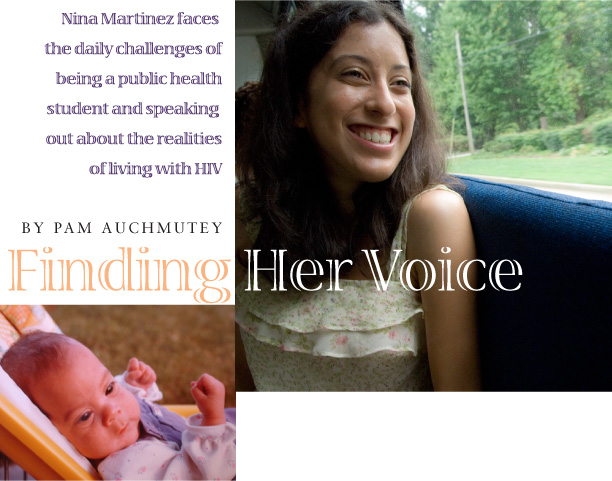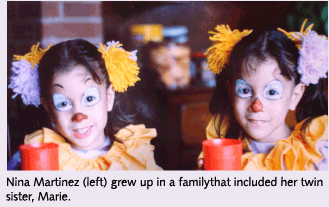














|
| |
| |
 |
| |
|
|
| |
 E-mail
to a Friend
E-mail
to a Friend  Printer
Friendly Printer
Friendly |
|
| |
|
|
| |
Nina
Martinez was 8 years old when she announced to her elementary school
classmates she was related to legendary basketball player Magic
Johnson. "Wow, how can that be?" they asked. "We
both have HIV," she answered.
Though she tended to joke about her
illness at first, the reality of living with HIV began to set in
when her principal questioned whether she should stay in school
(she did) and she began taking AZT, the breakthrough antiretroviral
drug, four times a day, including a dose in the middle of the night.
Every three months, she traveled from her home in New Jersey, where
HIV treatment was unavailable, to Washington, D.C., for follow-up
visits at Walter Reed Army Medical Center. Her parents learned of
her HIV status in December 1991, a month after Johnson announced
publicly he was HIV positive and a decade after scientists, physicians,
and public health workers first detected AIDS.
"The doctor told me that I had
HIV a month after my parents were told," recalls Martinez,
now 23 and an MSPH student in epidemiology at the Rollins School
of Public Health (RSPH). "He asked me, ‘Do you know
what that is?' I just equated it to Magic Johnson. That's
how I understood it."
It was pure accident that Martinez's
family found out about her disease several years after she was infected.
This "accident" eventually set her on a course leading
her to Atlanta and the RSPH.
Six weeks after her premature birth
in 1983, Martinez required a blood transfusion for anemia. The transfusion
worked its magic, and Martinez grew up healthy and happy in a military
family that included a twin sister. In December 1991, the 8-year-old
Martinez underwent eye surgery. The surgeon operated not knowing
she had mistakenly been given an HIV test usually reserved for hospital
patients 15 and older. A few days later, Martinez's parents
learned she was HIV positive.
To make matters worse, her family
learned that the military knew in 1989 that Martinez had acquired
HIV through the transfusion she received after her birth. The military
sent a letter of notification to the family's address in Hawaii.
The letter never reached them at their new address in New Orleans,
and no one followed up on her case. The Department of Defense's
Blood Look-Back program—implemented to notify patients infected
with HIV through blood transfusions—had failed. "The
military knew about my HIV two years before I ever received a diagnosis,"
says Martinez in a story about her on the website for Hope's
Voice, an organization that educates college students about HIV/AIDS.
"A notification that takes two years is certainly not ‘timely'
as the prevailing rules mandated. As it was, my diagnosis was not
a proper notification but pure accident." |
|
| |
|
|
|
| |
|
|
| |
CROSSING
PATHS |
|
| |
In
1993, the Martinez family crossed paths with James Curran, then
assistant surgeon general and associate director for HIV/AIDS with
the CDC. Curran wrote a letter to Martinez's father about
the CDC's role in protecting the blood supply. Martinez still
has the letter in the original envelope.
"Nina contacted me before she
applied to Rollins because I had been in contact with her father
when I was at the CDC," says Curran, now dean of RSPH. "She
wanted to know if I was the same person who had written her father
several years earlier. I met her in Washington at one of our alumni
meetings and introduced her to our school, and she applied here
to become one of our students."
Martinez holds an undergraduate degree
in mathematics and government from Georgetown University. She chose
to study in Washington because she loved the city where she first
received her HIV care. On top of studying, holding down two part-time
jobs, and living on her own for the first time, Martinez sought to balance
the demands of being a young adult student and HIV positive. In
2005, the "Road to Hope Tour," sponsored by Hope's
Voice, made its first stop at Georgetown, where Martinez heard college
students like herself talk about living with HIV/AIDS. Touched and
inspired, she works closely with the group today, speaking on the
group's behalf at Emory and other colleges and universities
and traveling to New York to work on the group's national
ad campaign, "Does HIV Look Like Me?"
living on her own for the first time, Martinez sought to balance
the demands of being a young adult student and HIV positive. In
2005, the "Road to Hope Tour," sponsored by Hope's
Voice, made its first stop at Georgetown, where Martinez heard college
students like herself talk about living with HIV/AIDS. Touched and
inspired, she works closely with the group today, speaking on the
group's behalf at Emory and other colleges and universities
and traveling to New York to work on the group's national
ad campaign, "Does HIV Look Like Me?"
After graduating from Georgetown,
Martinez sought a way to combine her love of math, government, medicine,
and public health. She chose Atlanta because it was a prime location
to study public health and receive regular health care at Emory.
"I came here because there was
such a good HIV-centric group of people," she says. "There
are people here who have been in the field since 1981." That,
of course, includes Curran, who has mentioned Martinez in his presentations
on the 25th anniversary of AIDS this year. "That's no
small cookie to swallow!" Martinez says.
Her challenge at hand is juggling
her studies in epidemiology while carving out more time to travel
and speak to college students through Hope's Voice. "I'm
speaking out because I want everyone to speak out too," says
Martinez, who hopes one day to work in the health policy arena.
"It's the 25th year of AIDS, and I've had HIV
for 23 of them. I feel I need to be out there more, at least this
year."
What about the future? "Like
Dr. Curran has said, HIV/AIDS is a young disease, and it's
going to take time, so we need to be patient to find a vaccine,"
she says. "I can't recall any other disease that's
had such an effect on culture and social norms. It affects who we
are, how we raise our children, every part of our lifestyle. When
we can be comfortable with each other and reach a certain level
of tolerance, maybe we can work our way toward a cure." |
|
| |
|
|
| |
|
|
|
|
|
|



